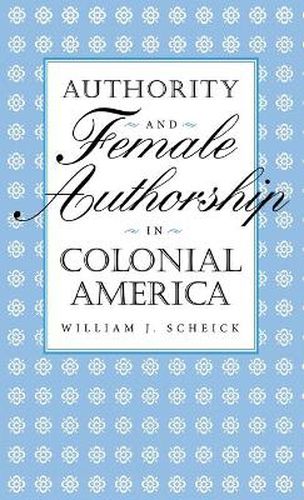Readings Newsletter
Become a Readings Member to make your shopping experience even easier.
Sign in or sign up for free!
You’re not far away from qualifying for FREE standard shipping within Australia
You’ve qualified for FREE standard shipping within Australia
The cart is loading…






Should women concern themselves with reading other than the Bible? Should women attempt to write at all? Did these activities violate the hierarchy of the universe and men’s and women’s places in it? Colonial American women relied on the same authorities and traditions as did colonial men, but they encountered special difficulties validating themselves in writing. William Scheick explores logonomic conflict in the works of northeastern colonial women, whose writings often register anxiety not typical of their male contemporaries. This study features the poetry of Mary English and Anne Bradstreet, the letter-journals of Esther Edwards Burr and Sarah Prince, the autobiographical prose of Elizabeth Hanson and Elizabeth Ashbridge, and the political verse of Phyllis Wheatley. These works, along with the writings of other colonial women, provide especially noteworthy instances of bifurcations emanating from American colonial women’s conflicted confiscation of male authority. Scheick reveals subtle authorial uneasiness and subtextual tensions caused by the attempt to draw legitimacy from male authorities and traditions.
$9.00 standard shipping within Australia
FREE standard shipping within Australia for orders over $100.00
Express & International shipping calculated at checkout
Should women concern themselves with reading other than the Bible? Should women attempt to write at all? Did these activities violate the hierarchy of the universe and men’s and women’s places in it? Colonial American women relied on the same authorities and traditions as did colonial men, but they encountered special difficulties validating themselves in writing. William Scheick explores logonomic conflict in the works of northeastern colonial women, whose writings often register anxiety not typical of their male contemporaries. This study features the poetry of Mary English and Anne Bradstreet, the letter-journals of Esther Edwards Burr and Sarah Prince, the autobiographical prose of Elizabeth Hanson and Elizabeth Ashbridge, and the political verse of Phyllis Wheatley. These works, along with the writings of other colonial women, provide especially noteworthy instances of bifurcations emanating from American colonial women’s conflicted confiscation of male authority. Scheick reveals subtle authorial uneasiness and subtextual tensions caused by the attempt to draw legitimacy from male authorities and traditions.